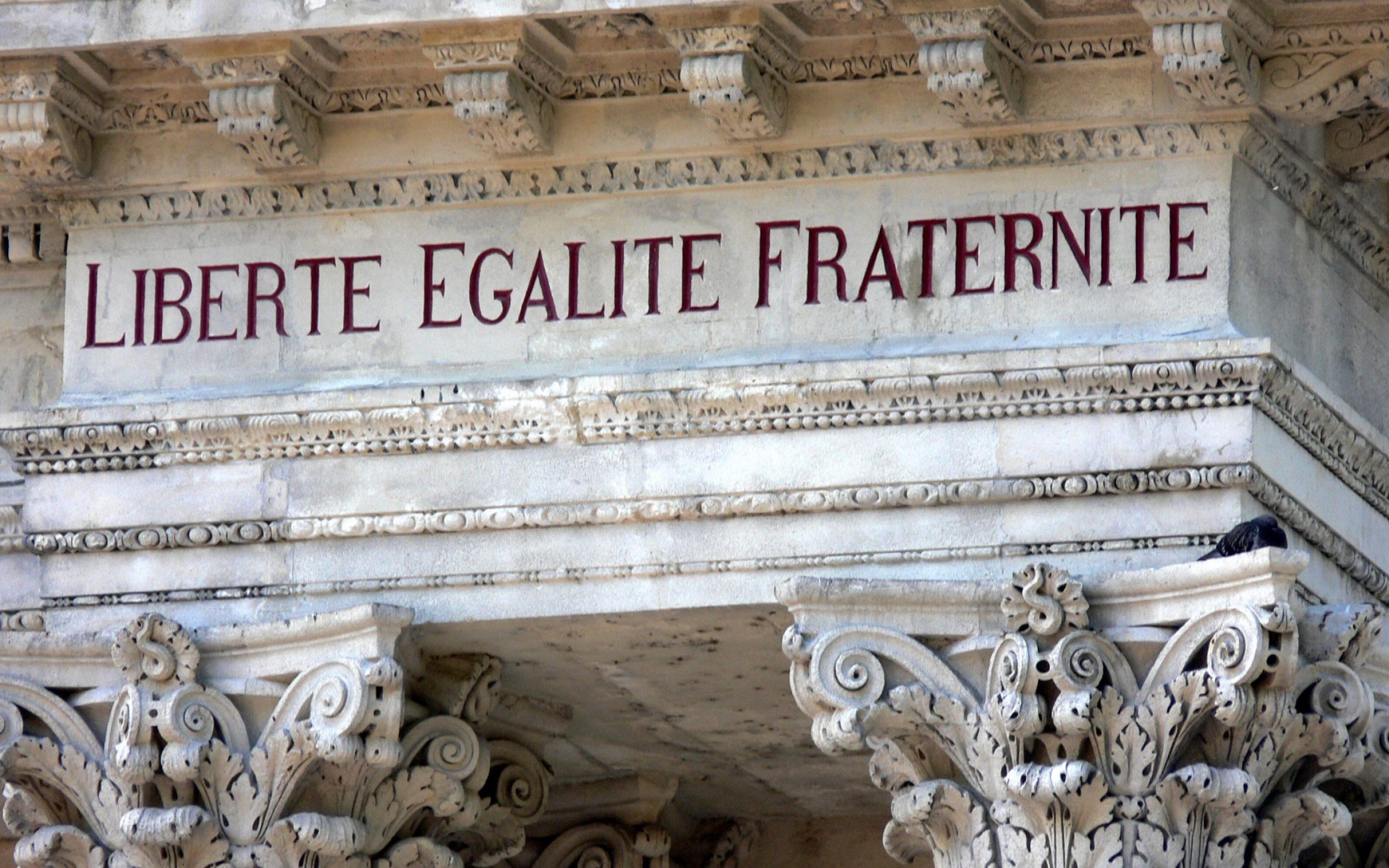This week sees the anniversary of the fall of the ancient French monarchy, when the château of the Tuileries was stormed by a revolutionary mob and its defenders, mainly Swiss Guards, were brutally slaughtered.
Although Bastille Day on 14 July – which commemorates the similar massacre of another contingent of Swiss and the Invalides, serving as France’s equivalent of the Chelsea Pensioners- is the national holiday celebrating the Revolution, it was on 10 August 1792, that the monarchy finally succumbed to mob violence and was replaced by a republic.
The French Republic (currently the Fifth incarnation of the genre) is the heir of the Revolution. Its rhetoric, iconography and institutions aggressively proclaim the fact, down to the small-town mayors tricked out in tricolour sashes, like members of the Committee of Public Safety. That is the squalid identity that has been imposed upon what was, for many centuries, the greatest civilisation in Europe, the Eldest Daughter of the Church.
The history of France is the most engrossing and impressive of any nation, from the baptism of Clovis, King of the Franks, around 500. Yet the revolutionary calendar which, with classic radical narcissism, redefined 1792 as Year I of the Republic, despite having been abolished after twelve years, remains the chronological mindset of the French political class. Thirteen centuries of Christian civilisation have been relegated to obscurity; instead, since 1871, the French state has perversely identified with a violent convulsion that, until the advent of the Soviet Union and the Third Reich, was the most terrible experience in European history.
Why would any government wish to proclaim its origins in the French Revolution? Was there ever any event that so symbiotically combined horror and fatuity? By 1802 the French Revolution had claimed 1.4 million lives – an extreme hecatomb in the demographics of the period. To this the Napoleonic Wars, an extension of the Revolution, added a further 6 million across Europe and Russia. So, seven and a half million people lost their lives as a consequence of the Revolution and its parent, the pseudo-Enlightenment.
All the solipsistic epigrams of Voltaire, the claptrap of the arch-charlatan Rousseau – the expert on child rearing who put his own children into an orphanage – the vapourings of Camille Desmoulins and hundreds of other rabble-rousers, spouting ridiculous verbiage, posing as classical Roman heroes and vying with one another in the extravagance of their sentiments: their outcome was a bloodbath.
To read the speeches delivered in the National Assembly and, later, the Convention is to view with incredulity the extent to which narcissism can dispel reason – the mental attribute they claimed to worship, to the extent of installing a prostitute as the “Goddess of Reason” on the high altar of Notre Dame. The Declaration of the Rights of Man found its embodiment in the Law of the Suspect and the Law of 22 Prairial, the revolutionary tribunal, the prison massacres of September 1792, the mass drownings by Carrier at Nantes and innumerable other atrocities.
Europe had experienced mass atrocities before, notably during the Thirty Years War, but the French Revolution was something novel. In response to the royalist and Catholic uprising in the Vendée, on 1 August 1793, the Convention decreed the systematic destruction of the province, the razing of farms and dwellings, the extermination of the inhabitants and all domestic animals, the burning of crops and forests. This was the first systematic attempt by a government to exterminate its own people. It was the first genocide.
“Not one is to be left alive…” “Women are reproductive furrows who must be ploughed under…” “Fire, blood, death are needed to preserve liberty…” Such was the discourse of the Convention. Estimates of the numbers killed in the Vendean genocide range from 117,000 to 400,000. Babies were killed in front of their mothers who were then murdered, girls were raped and drowned, children were baked in ovens. The man whose Twelve Infernal Columns executed these atrocities, General Louis-Marie Turreau, is commemorated on the Arc de Triomphe, along with other scoundrels.
A tannery for human skin (prefiguring Nazi industry) was established at Angers. There was already one operating at Étampes and another at Meudon; among its customers was Louis de Saint-Just, Robespierre’s chief lieutenant, who wrote: “The skin that comes from men is of a consistency and richness superior to that of the chamois. That of the female subjects is more supple, but provides less solidity.” Saint-Just wore breeches made of human skin, as did Philippe Égalité, the renegade Duc d’Orléans, cousin of Louis XVI, and other deputies at the Festival of the Supreme Being.
When the historian Reynald Secher revealed the truth about the Republic’s genocide, it cost him his academic career. French historiography is the exclusive province of admirers of Robespierre; they are as fanatical in defending the Republic’s foundation myth as any Terrorist in 1793. That is the root of the problem. France has a constitutional order built upon a lie, that the French Revolution was “a good thing”. The effect on its culture is necessarily toxic.
All the kitsch cult of “Marianne”, the cockerel emblem replacing the fleur-de-lis, the stark, geometric tricolour unconsciously expressing the vacuity of the republican myth and its role as a barrier to embracing the rich pre-1789 heritage of France – all that amounts to a cultural straitjacket. One could not ask for a better illustration of the banality of the post-Revolution concept of France than to listen to Emmanuel Macron expounding the republican dogma of “laïcité” – a euphemism for anticlericalism.
Since the Revolution there have been two embodiments of France: one the legacy of the deluded ideologues of the National Convention, based on Liberty, Equality and Fraternity; the other the patrimony of St Louis, Catholic and living its traditions to a different pulse. Pope Leo XIII foolishly tried to bridge that gulf by promoting the Ralliement and the Church was rewarded for his pains by the ousting of religious orders from education and, in 1905, by the Republic’s confiscation of all cathedrals and churches.
The scandal known as “l’affaire des fiches” exposed how the government, assisted by the Masonic lodges, prevented the promotion of Catholic army officers. In 1914 the same elements ensured that units from the most Catholic regions of France were the first to be herded towards the German machine-guns. That fissure remains today. Republican ideologues have done France no favour by shackling its identity to one of the most evil episodes in European history: it is as if Germany perversely looked back to National Socialism – of which French Jacobinism was the ideological inspiration –as its foundation myth. The false cult of the Revolution means that modern France is built upon a sewer.
This malign legacy has resonances far beyond France. The French Revolution is also mythologised in Britain. The mythological narrative of Ancien Régime tyranny, revolutionary virtue and reform creating liberty needs to be expunged from a public imagination whose impression of the Revolution is largely derived from Charles Dickens’ portrayal of homicidal nobles driving over children in Parisian streets.
Above all, the fiction of Bourbon “absolutism” must be discredited. Louis XVI summoned the Estates General because he needed to raise taxes. Had he enjoyed absolute power, he would not have needed to call a parliament. So far from being absolute, if the King of France created someone a duke – the ennobling prerogative being the most fundamental right of royalty – the dukedom would remain invalid, except as a courtesy title at court, if the local parlement arbitrarily refused to register it.
Yet Napoleon, implausibly represented by some historians as the “liberal” alternative to the Bourbons, on the strength of his retaining the tricolour flag, was a military dictator with such absolute power as Louis XIV could never have dreamed of exercising. His secret police prefigured modern totalitarianism, as did the tyranny of the genocidal Republic. Until we dispel all illusions about the French Revolution representing “progress”, we shall be incapable of seeing our own age clearly.
The same goes for the Revolution’s salon-bound, supper-table prelude, the pseudo-Enlightenment. Having abandoned religion, modern man attempts to find wisdom and authority in the writings of so-called enlightened philosophers. What really resides in their works is a crippling, one-dimensional view of existence, due to their excision of the metaphysical from their worldview. That spiritual vacuum leaves society vulnerable to depraved ideas masquerading as “progress” or “liberalism”, as the experience of the French Revolution demonstrated. It is more than time for a radical reappraisal of the tired and discredited orthodoxies of the soi-disant Age of Reason.





